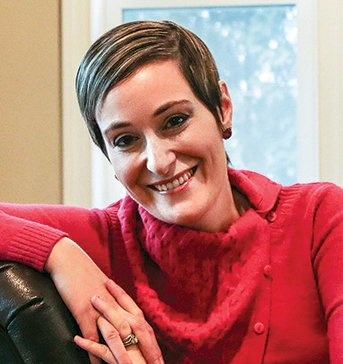Columbia College | Columbia University in the City of New York
“When Good Genes Fail,” by Dr. Tali Lando Aronoff ’00
In honor of Breast Cancer Awareness month, the following is a modified excerpt from Hell & Back: Wife & Mother, Doctor & Patient, Dragon Slayer, Aronoff’s book about her experience with breast cancer diagnosis and treatment.
“Begin at the beginning,” the King said, very gravely, “and go on till you come to the end: then stop.” — Lewis Carrol, Alice in Wonderland
I am a 42-year-old pediatric ENT surgeon. After graduating summa cum laude from the College at the start of the new millennium with a major in neuroscience, I was accepted into Weill Cornell Medical School. Following four years of working my ass off, I again graduated with honors. If you add medical school (four), otolaryngology residency (five) and pediatric otolaryngology fellowship (two), that’s 11 years of training in the attainment of a single goal. In summer 2013, it had all finally begun to feel worth it. I loved what I did. I loved my patients (at least most of the time), the anatomy involved and the surgeries I was privileged to perform. Although it could be stressful and frustrating, as all jobs are, I believed that either by fate or happy coincidence, I was meant to be doing this work.
In the two years preceding my July 2013 diagnosis, I had joined a respected medical practice and had finally started earning an adult’s salary. I’d also popped out my third daughter in four years. My family felt nearly complete and my husband, Alex, I and our children had moved into a friendly community in lower Westchester. After a rocky start in my early 20s culminating in an unpleasant divorce (sans kids) to a person who I’d foolishly stayed with for five years, I was now married to a wonderful and loving man.
Life was starting to shape up quite nicely and I thought I was looking at a few years of smooth sailing. There had been a recent bump in the road when, six months earlier, at 34 weeks gestation with my third child, I had to emergently deliver my unbaked 3-pound daughter, Milla Nadiya Aronoff, due to severe preeclampsia. Thankfully, she was born beautiful and breathing. After a five-week stint in the neonatal intensive care unit, we brought her home, healthy and weighing a whopping 4 pounds. I quickly began to ramp up my practice again. I was finally getting more sleep and trying to calibrate my work/life balance. Overall, I was feeling smug — while secretly constantly crossing my fingers — because while I hate to admit it, I was beginning to believe I could have it all.
I had never been afraid of illness. Longevity was in my bloodlines and I had always been healthy, both mentally –– aside from some requisite neuroses –– and physically. More than that, I had never taken a sick day in my entire training, not for the flu or a GI bug or even throughout two pregnancies. In both gestations, I easily worked full 13-hour days on the Fridays immediately before the Sundays on which I was electively induced. My maternal and paternal grandparents had lived full and healthy lives, dying in their late 80s or early 90s from various non-cancerous causes. I had no reason to fear.
In my very large family, including dozens of great-aunts, six aunts, and 22 female first cousins, there were no recorded incidents of breast cancer. I did fear many scary things, big and small, as most young mothers do (car accidents, chipped teeth, SIDS, autism, etc.), but not this particular disease. I strongly believed in the power of good genes — which is why I ultimately felt so blindsided.
It all began on Saturday night, July 20, at 8:15. I called my mother to see how my parents’ weekend was going. “Something is wrong with Aba,” she said immediately. My dad, affectionately called by the Hebrew name for father, had been in a conversation with a group of friends earlier that day when he experienced word-finding problems. Within 24 hours of that call, I found myself sitting at a computer monitor at CUMC staring at the scariest image I could imagine: my father’s malignant brain tumor.
I’ll never know why, eight days later, lying in my bed and unable to sleep because of concern over my father’s impending craniotomy, I inadvertently brushed my right hand against the left side of my chest. When I did, I felt a distinct, hard mass. In that moment, I immediately knew that a storm was coming.
At 9:01 the next morning, while my first patient was waking up from general anesthesia, I cold-called Dr. Julian Sanchez, a breast radiologist at my institution. Over the phone, he reassured me that because I was young, had no family history and had just stopped nursing several months prior, the lump was most likely a blocked milk duct. Despite his optimism, he encouraged me to come in later that day for an examination and imaging. His presumptive theory was soothing, allowing me to finish my work day with less worry. Unfortunately, his assumption was also very wrong.
Starting that evening and continuing over the next days, there were ultrasounds, mammograms and biopsies. There was initial bad news, turned worse with the confirmation of lymphatic spread. But, even in those early days of darkness and confusion, the one thing I knew for sure was that I had to act definitively and swiftly. God knows, I didn’t want to give this cancer bastard a chance to spread any further.

More “Lion’s Den”
- 1 of 5
- ›

